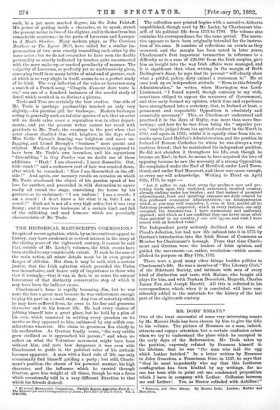THE HISTORICAL MANUSCRIPTS COMMISSION.* IN spite of recent agitation, which,
by an intermittent appeal to history, may have awakened or revived interest in the story of the closing years of the eighteenth century, it cannot be said Oat, outside of Mr. Lecky's volumes, the Irish events have been studied to any considerable extent. If such be the case of the main action, all minor details must be in even greater danger of oblivion. But then, it may be said, with a certain justice, that the Irish agitation which preceded the Union was inconclusive, and hence only of importance to those who view it wrongly,—that it was, in fact, in no sense the natural forerunner of that distinctly conservative step of which it may have been the indirect cause.
Charlemont's fame is rapidly becoming dim, but he was none the less a great man because he was unfortunate enough to play his part on a small stage. Any loss of notoriety which he may have suffered from, he owes to his fine and generous character and to his honest life. He had every chance of jobbing himself into a great place, but he held by a plan of his own, which consisted in settling every question on its merits as they appeared to him, unbiassed by any selfish con- siderations whatever. His claim to greatness lies chiefly in his moderation. As Grattan fondly wrote, "the very rabble grew civilised as it approached his person ;" and when we reflect on what the Volunteer movement might have beat without him, and note how dangerous it was even with Charlemont to guide it, the political value of his attitude becomes apparent. A man with a fixed rule of life can Only occasionally find himself guiding a party ; but still, Charle- mont's position, the charm of his personal manner, his high character, and the influence which he exerted through Grattan, gave him weight at all times, though he was a force which occasionally told in a very different direction to that which his friends desired.
• Hittorical Manuscripts Commission. Twelfth Espott,-Appendix. Fart :— l'hs Manuscripts and Correspondince of James, First Earl of Charlmont. Vol. I. 1745-1783.
The collection now printed begins with a narrative, hitherto unpublished, though used by Mr. Lecky, by Charlemont him-
self, of his political life from 1753 to 11783. The volume also contains his correspondence for the same period. The narra- tive appears to have been originally intended for the instruc- tion of his sons. It consists of reflections on events as they occurred, and the margin has been noted in later years. Charlemont's first important transaction in reference to a
difficulty as to a sum of 220,000 from the Irish surplus, gave him an insight into the way Irish affairs were managed, and it is significant that, when writing in the margin of Bubb. Dodington's diary, he says that its perusal "will clearly show what a pitiful, paltry, dirty animal a statesman is." He at once took up an independent attitude. "Even in this friendly Administration," he writes, when Harrington was Lord- Lieutenant, "I found myself, though contrary to my wish, sometimes obliged to oppose the measures of Government, and thus early formed my opinion, which time and experience have strengthened into a certainty, that, in Ireland at least, a permanent and respectable Opposition is absolutely and essentially necessary." This, as Charlemont understood and practised it in the days of Rigby, was more than mere fine- writing ; and how far he was from being the "superior per- son," may be judged from his spirited conduct in the North in 1760, and again in 1763; whilst it is equally clear from his re- marks upon Lord Halifax's Administration, and the position in Ireland of Roman Catholics (to whom he was always a very cautious friend), that he maintained his independent position. He did not abandon it throughout his life, even though he became an Earl; in fact, he seems to have acquired the love of opposing because he saw the necessity of a strong Opposition. He complained under the Earl of Hertford, under Lord Town- shend, and under Earl Harcourt, and there was cause enough, as every one will acknowledge. Writing to Flood on April 13th, 1775, he says :—
"Let it suffice to say, that every day produces new and pro- voking loads upon this wretched, exhausted, insulted country, already sinking under her burden ; and that instead of promised retrenchment, fresh and insulting expenses are daily created by this professed economical Administration,—an Administration which, as you may well remember, I, even at first, amidst all its flattering promises, suspected; which in every instance, one only excepted, the Absentee-tax, I have strenuously and uniformly opposed ; and which as I am confident they can never mean other than mischief to my country, I ever witi oppose, and wish I were armed with an hundred votes."
The Independent party seriously declined at the time of Flood's defection, but had new life infused into it in 1775 by Grattan's introduction into the Irish House of Commons as Member for Charlemont's borough. From that time Charle- mont and Grattan were the leaders of Irish opinion, and guided the movement—or, rather, revolution—which accom- plished its purpose on May 17th, 1782.
There were a good many other things besides politics in Charlemont's life. He was a member of "The Literary Club," of the Dilettanti Society, and intimate with men of every kind of distinction and taste, with Malone, who bought old plays for him, and with Topham Beauclerk, Hogarth, Charles James Fox, and Joseph Baretti. All this is reflected in his correspondence, which, when it is concluded, will have con- siderably added to the materials for the history of the last part of the eighteenth century.


































 Previous page
Previous page